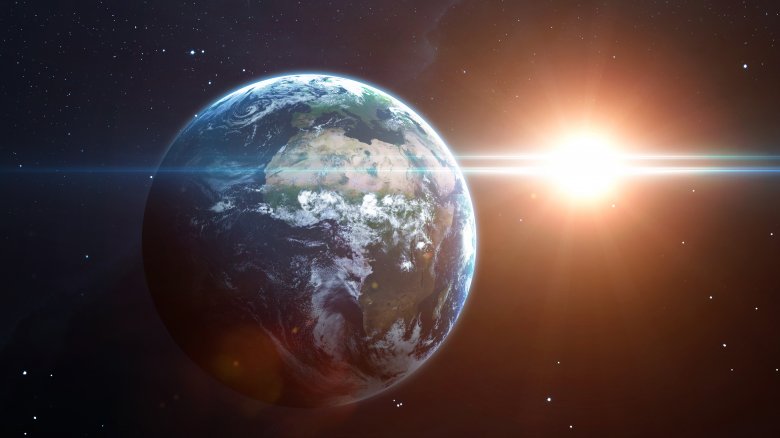What Would Happen If The Earth Stopped Spinning?
First, the good news. There are a lot more likely ways the human race will end than the Earth suddenly stopping its eternal rotation. No force known to humankind — except maybe Superman — could make the Earth suddenly stop spinning, and scenarios where the Earth instantly or rapidly stops spinning are completely hypothetical. The slightly less good news is that if we're wrong about that and it one day does happen to us, we're pretty much screwed.
Let's start with the most extreme scenario, and imagine that dastardly aliens directed an enormous tractor beam thingy at our planet, and its rotation stopped instantly. According to Smithsonian, anything not bolted down would instantly move East — a lot. Everything from mountains of rock, to forests and oceans would immediately be hurled in the same direction at the speed of the Earth's rotation: around 1000 miles per hour. It's possibly stating the obvious, but puny terrestrial lifeforms wouldn't have much chance of surviving this rotation-nullifying Armageddon — unless you happened to be a scientist stationed at either the North or South Pole. As described by Universe Today, these lucky folks would barely feel the planet's shuddering halt. Radios would simply become eerily silent and they'd be left stranded at their research stations, desperately wondering what happened as days of bleak isolation from the rest of the world turned into weeks. It wouldn't be fun.
But let's assume the alien's tractor beam was only functioning at half strength, and Earth's slow-down was a little more gradual, taking a few decades. Unfortunately, the news here is only slightly less bleak.
The boundaries between land and ocean would radically change. Anyone who has subjected themselves to quickly spinning fairground rides will be familiar with centrifugal force. As an object spins, an apparent force is generated that acts outwardly away from the center of rotation. The same energy pressing you into your seat as you spin rapidly on a fairground ride would happen on a planetary scale. Not surprisingly, it's really quite important to life as we know it! ESRI (a geographical information systems platform) used GIS modeling to analyze what would happen if this energy was suddenly removed from the equation. In the absence of the steady outward force of centrifugal motion, ESRI calculates the oceans of the world would gradually migrate toward the planet's poles, leaving a huge mega-continent spanning the world's equator like a giant belt. What was once the ocean floor would become vast desert plains, and the two poles of our planets would become massive, deep unnavigable oceans.
Humans are a hardy lot, but in the unlikely event any were left breathing after this centrifugal disappearance, they'd definitely have their work cut out for them. A day would last a year, and every part of the planet's mega-continent would be subjected to six months of blazing daylight followed by six months of freezing darkness. According to Science Focus, the only viable place for life would be along the coastline, and conditions would likely only support primitive lifeforms. So while fidget spinners may be evil, planetary spinning is a very good thing.
